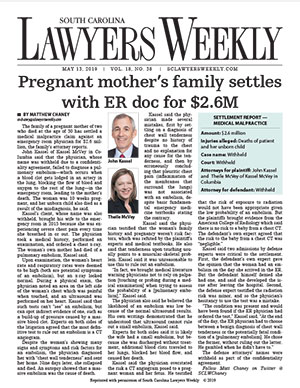Disclaimer: Any results that the firm may have achieved on behalf of its clients in other matters does not necessarily indicate similar results can be obtained for you. These settlement and verdicts are for general information only.
Article As Written in Lawyers Weekly
The family of a pregnant mother of two who died at the age of 30 has settled a medical malpractice claim against an emergency room physician for $2.6 million, the family’s attorney reports.
John Kassel of Kassel McVey in Columbia said that the physician, whose name was withheld due to a confidentiality agreement, failed to diagnose a pulmonary embolism—which occurs when a blood clot gets lodged in an artery in the lung, blocking the flow of blood and oxygen to the rest of the lung—in the emergency room, leading to the mother’s death. The woman was 10 weeks pregnant, and her unborn child also died as a result of the misdiagnosis, he said.
Kassel’s client, whose name was also withheld, brought his wife to the emergency room in 2015 because she was experiencing severe chest pain every time she breathed in or out. The physician took a medical history, performed an examination, and ordered a chest x-ray. The woman’s own mother had died of a pulmonary embolism, Kassel said.
Upon examination, the woman’s heart rate and respiratory rates were deemed to be high (both are potential symptoms of an embolism), but an x-ray looked normal. During a physical exam, the physician noted an area on the left side of the woman’s chest which was painful when touched, and an ultrasound was performed on her heart. Kassel said that such tests can’t “see” an embolism, but can spot indirect evidence of one, such as a build-up of pressure caused by a massive blood clot. Experts on both sides of the litigation agreed that the most definitive test to rule out an embolism is a CT angiogram.
Despite the woman’s showing many signs and symptoms and risk factors for an embolism, the physician diagnosed her with “chest wall tenderness” and sent her home. Nine days later, she collapsed and died. An autopsy showed that a massive embolism was the cause of death.
Kassel said the physician made several mistakes, first by settling on a diagnosis of chest wall tenderness despite no history of trauma to the chest and no explanation for any cause for the tenderness, and then by erroneously concluding that pleuritic chest pain (inflammation of the membranes that surround the lungs) was not associated with an embolism, despite basic fundamental emergency medicine textbooks stating the contrary.
Kassel said the physician testified that the woman’s family history and pregnancy weren’t risk factors, which was refuted by the plaintiff’s experts and medical textbooks. He also said that tenderness upon touching usually points to a muscular-skeletal problem. Kassel said it was unreasonable to use this to rule out an embolism.
“In fact, we brought medical literature warning physicians not to rely on palpation [touching or probing during a medical examination] when trying to assess the probability of a [pulmonary embolism],” Kassel said.
The physician also said he believed the likelihood of an embolism was low because of the normal ultrasound results. His own writings demonstrated that he understood that ultrasound cannot rule out a small embolism, Kassel said.
Experts for both sides said it is likely the wife had a small embolism, but because she was discharged without treatment, additional blood clots traveled to her lungs, blocked her blood flow, and caused her death.
Kassel said the physician overstated the risk a CT angiogram posed to a pregnant woman and her fetus. He testified that the risk of exposure to radiation would not have been appropriate given the low probability of an embolism. But the plaintiffs brought evidence from the American College of Radiology which said there is no risk to a baby from a chest CT. The defendant’s own expert agreed that the risk to the baby from a chest CT was “negligible.”
Kassel said two admissions by defense experts were critical to the settlement. First, the defendant’s own expert gave the opinion that the woman had an embolism on the day she arrived in the ER. But the defendant himself denied she had one, and said she developed the issue after leaving the hospital. Second, the defense expert testified the radiation risk was minor, and so the physician’s hesitancy to use the test was a mistake.
“The condition was present and would have been found if the ER physician had ordered the test,” Kassel said. “At the end of the day, the ER physician had to choose between a benign diagnosis of chest wall tenderness or the potentially fatal condition of a [pulmonary embolism]. He chose the former, without ruling out the latter. He gambled when he didn’t have to.”
The defense attorneys’ names were withheld as part of the confidentiality agreement.
SETTLEMENT REPORT – WRONGFUL DEATH
Amount: $2.6 million
Injuries alleged: Deaths of patient and her unborn child
Case name: Withheld
Court: Withheld
Attorneys for Plaintiff: John Kassel and Theile McVey of Kassel McVey in Columbia
Attorneys for Defendant: Withheld
Personal Injury Lawyers 1330 Laurel Street Columbia, SC 29201 Phone: 803-256-4242
Mailing Address
Post Office Box 1476
Columbia, South Carolina 29202
Fax: (803) 256-1952
Copyright © 2023 John D. Kassel, Attorney at Law, LLC. All rights reserved. Privacy Policy I Terms of Service | Disclaimer
This website is designed for general information only. The information should not be construed to constitute formal legal advice or the formation of a lawyer/client relationship. The results and testimonials listed on this website are specific to the facts and legal circumstances of specific cases and should not be used to form an expectation that the same results could be obtained for other clients in similar matters. This list is not a description or characterization of the quality of the firm's representation, it is not intended to compare one attorney's work to another and is in no way a guarantee of a specific result for your case.


